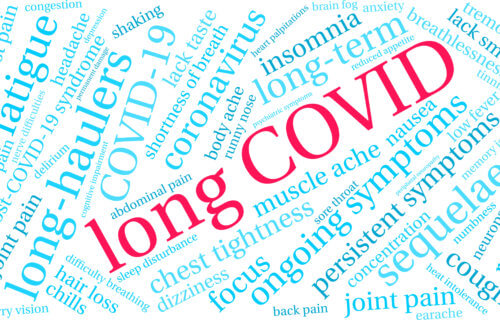BOSTON — Usually, a bout of coronavirus is sudden, intense, and brief. Most patients recover completely. About 20 to 40 percent of patients, however, experience long-term health effects, a condition called post-COVID-19 syndrome (PCS), post-COVID-19 condition (PCC), or informally, long COVID. Now, a new study by researchers at the Harvard T.H. Chan School of Public Health finds that a healthy lifestyle may be the best defense against lingering long COVID symptoms.
Long COVID has a wide range of symptoms that affect everyday living. Some are dry cough, shortness of breath, chest pain or pressure, extreme fatigue, aches and pains, diarrhea, headache, confusion, conjunctivitis (pink eye), fever, and others. When it comes to preventing this, researchers say five specific healthy actions can help lower the risk of COVID-19 becoming long COVID by about 50 percent. The five lifestyle factors are:
- Having a healthy body mass index (BMI) of 18.5 to 24.9
- Moderate-to-vigorous physical activity for at least 150 minutes per week
- Moderate alcohol intake (5-15 grams per day)
- Eating a high-quality diet
- Adequate sleep (7-9 hours per day)
Smoking is also a long COVID-related problem
A sixth factor associated with less risk for long COVID is never having smoked. That isn’t modifiable, of course. If you previously smoked but quit, good for you. Don’t restart. If you smoke, researchers suggest seeing your healthcare provider about quitting. You’ll be healthier in every way.
The Harvard study used lifestyle data collected from more than 32,000 female nurses starting in 2015. The research team documented 1,981 individuals with positive COVID-19 tests. Fewer than 10 percent of the participants received a COVID-19 vaccination.
The course of disease was followed with interval reporting of symptoms. The most reported symptoms were fatigue (57.1%), smell or taste problems (40.9%), shortness of breath (25.3%), confusion/disorientation/brain fog (21.6%), and memory issues (20.0%).
Risk of long COVID was lower with increasing numbers of healthy lifestyle factors. Compared with women who did not adhere to any healthy lifestyle factors, those having five or six factors cut their risk for the condition in half. Among the women who developed long COVID, there were fewer symptoms in those with higher healthy lifestyle scores, except for smell and taste problems and headache. The scientists also speculated on explanations for the results.
“Chronic inflammation may predispose individuals to excessive release of cytokines after infection, subsequently increasing risk for long-term complications in multiple organs. (Inflammation is the body’s response to injury or infection. Cytokines are substances produced by some immune cells that have effects on other cells.) Second, these unhealthy lifestyle factors dysregulate adaptive autoimmunity, which has been found in individuals with PCC,” the researchers write in JAMA Internal Medicine.
Taking a closer look at healthy lifestyle factors
- Body mass index (BMI) uses height and weight to indicate your amount of body fat. As excess body fat increases, your risk for virtually all diseases increases. A healthy BMI equals 18.5 to 24.9, overweight is between 25 and 29.9, obesity is 30 or greater. Calculate your BMI here
- At least 150 minutes per week of moderate-to-vigorous physical activity is part of a healthy lifestyle. The United States Preventive Services Task Force (USPSTF) provides activity guidelines online. Physical Activity Guidelines for Americans
- Alcohol intake should be no more than five to 15 grams daily. The CDC recommends no more than two drinks per day for adult men, and no more than one drink per day for adult women. Facts about moderate drinking
- The standards for a high-quality diet follow the 2020-2025 Dietary Guidelines for Americans. Guidelines for Americans, 2020-2025
- Adequate sleep means getting seven to nine hours a night. Insufficient sleep has links to the development of numerous chronic diseases and conditions, including Type 2 diabetes, cardiovascular disease, obesity, and depression. Researchers say be consistent. Go to bed at the same time each night and get up at the same time each morning, including on the weekends. To do this, make sure your bedroom is quiet, dark, relaxing, and at a comfortable temperature. It also helps to remove electronic devices, such as TVs, computers, and smart phones, from the bedroom. Being physically active during the day can also help you fall asleep more easily at night. How Much Sleep Do I Need?
“In the past decades, scientists have accumulated evidence that healthy lifestyle is good for overall health. However, in the U.S. for example, 70% of the population do not have a healthy body weight and 30% do not sleep enough. Findings from this study suggest that simple lifestyle changes, such as having adequate sleep, may be beneficial for the prevention of long COVID,” says lead author Siwen Wang, research fellow in the Department of Nutrition, in a university release.
